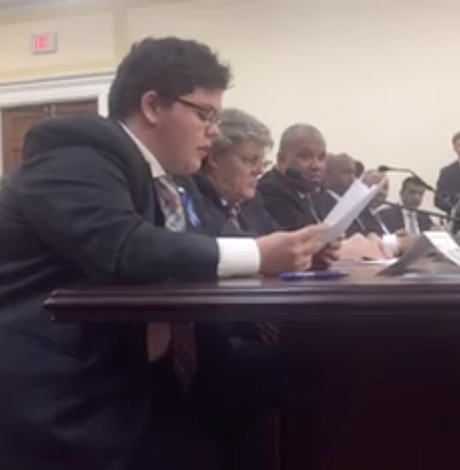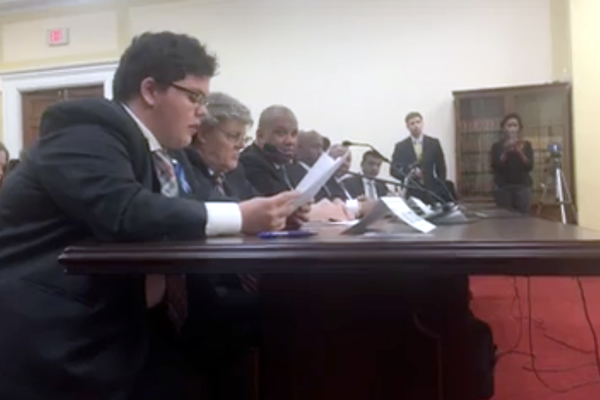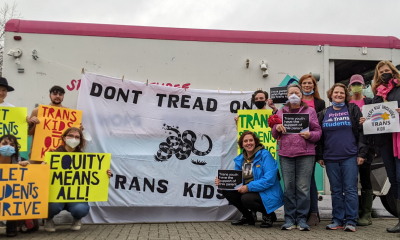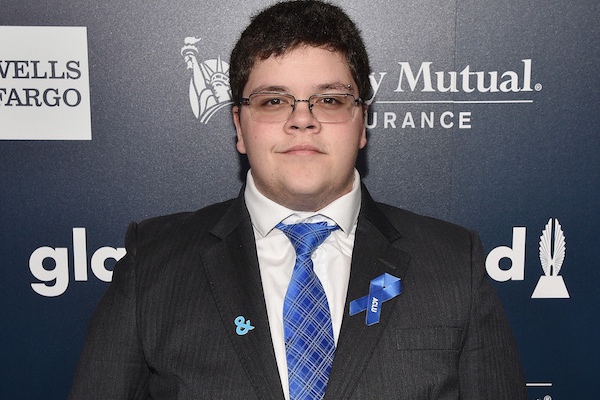News
Gavin Grimm testifies on civil rights after 100 days of Trump
Panel witness decry review of consent decrees, voter ID laws


Gavin Grimm testifies before Congress on April 6, 2017. (Screen capture courtesy Washington Blade Facebook)
Transgender student Gavin Grimm testified before Congress Thursday on the experience of his Virginia high school denying him access to the bathroom consistent with the gender identity as well as harms the Trump administration’s withdrawal of pro-trans guidance has caused for transgender people.
Gavin made the remarks during a congressional forum hosted by U.S. House Democrats on the state of civil rights after the first 100 days of the Trump administration. Witnesseses sharply criticized the Trump administration — in particular the U.S. Justice Department under U.S. Attorney General Jeff Sessions — for failing to live up to equal protection under the law.
Currently suing his school for bathroom access in a lawsuit the U.S. Supreme Court was once poised to consider, but later rejected, Gavin recalled the pain he felt during hearings in which the Gloucester County School Board decided to refuse to treat him consistent with his gender identity.
“World had spread throughout the community, and people turned up in droves,” Gavin said. “After each frenzied remark, clapping and hollering reverberated throughout the room. I sat while people called me a freak. I sat while my community got together to banish a child from public life for the crime of harming no one. I sat while my school board voted to banish me to retrofitted broom closets or the nurse’s room.”
As Gavin narrated his story, the microphone system for the room in the Rayburm House Office Building cut out, prompting one forum participant to quip, “The Democrats do not control this room.” Invited by Rep. John Conyers (D-Mich.), who was chairing the forum, to speak closer to the dais from a podium, Gavin continued his story.
Recalling the pledge from the White House that President Trump would be “respectful and supportive of LGBTQ rights,” Gavin said the administration’s decision to nix Obama-era guidance assuring transgender kids bathroom access in accordance with their gender identity “could not have been more damaging for trans youth.”
“The guidance had a very simple message: Treat trans students with dignity and respect them for who they are,” Gavin said. “Treating trans students with dignity and respect should not be controversial. The decision to withdraw the guidance sent a terrible message to some of the most vulnerable people that President Trump – the leader of our country – and his administration do not care about protecting you from discrimination.”
After Gavin completed his testimony, attendees at the forum clapped for a lengthy amount of time. Conyers commended him, saying he’s a “courageous young man and you deserve our support and applause.”
Catherine Lhamon, chair of the U.S. Commission on Civil Rights and former assistant secretary for civil rights at the Education Department under the Obama administration, made the transgender guidance rollback a major point of concern during testimony in which she said civil rights under the Trump administration has been “horrendous.”
“It will not surprise this body that that withdrawal offended me because I signed that guidance when I was assistant secretary of civil rights,” Lhamon said.
Lhamon called Trump administration claims the guidance was withdrawn because of improper procedure and incorrect interpretation of Title IX of the Education Amendments of 1972 “categorically untrue,” citing “the many years that all the relevant agencies” spent investigating the facts and speaking the school administrators.
“To think more that whether a federal law that Congress wrote that says explicitly that no person in the United States shall be subject to sex discrimination in school applies to transgender students questions the very humanity of transgender students,” Lhamon said.
Lhamon also took issue with the appointment of Roger Severino, a former researcher for the anti-LGBT Heritage Foundation, to the role of assistant secretary for civil rights at the Department of Health & Human Services. Once in the position of being critical of the Obama administration’s efforts to ensure transgender people have access to transition-related care, Severino will now be charged with protecting transgender people in health care.
“I will never forget how I heard from former HHS civil rights director about a case in which emergency medical professionals refused to treat a transgender women because she is transgender,” Lhamon said. “She later died, although she had a better than 35 percent of survival had she received appropriate and timely medical care. It should go without saying that the director of HHS civil rights should be committed to ensure the fair medical treatment for all persons, regardless of identity status.”
The issue of transgender rights was but one issue before the forum that sought to address the multitude of challenges the civil rights community after 100 days of the Trump administration.
Conyers, the top Democrat on the House Judiciary Committee, expressed a dismal view of the current state of civil rights as he chaired the forum, referencing a “documented loss in the overall climate of equality” and rise in hate violence since the 2016 election.
“Minority communities have been justifiably concerned about the continued role of the federal government in protecting civil rights,” Conyers said. “The Trump presidential campaign promised meaningful changes that would benefit minorities in the area of crime, equal justice and economic equality, his political allies and surrogates to the media have sent a different message that served to heighten national divisions and anxiety.”
DOJ criticized for consent decree review
A central issue was the decision this week of U.S. Attorney General Jeff Sessions to review the consent decrees the U.S. Justice Department had arranged with police departments after patterns of unconstitutional racial discrimination and excessive force, including the shootings of black men.
Chiraag Bains, senior fellow at Harvard Law School Criminal Justice Policy Program and former senior counsel to the assistant attorney general for civil rights under President Obama, cited the review as evidence the Justice Department has been “predictably disastrous” on civil rights.
“This administration insists that policing is a purely local matter into which the federal government should not intrude,” Bains said. “But we’re not talking about a federal takeover of these departments. We’re talking about the enforcement and protection of constitutional rights. There is no federalism problem.”
Ron Davis, former director of the Office of Community Oriented Policing Services at the Justice Department, invoked the words of 19th Century British statesman Robert Peel to describe the appropriate relationship between the police and communities as defined under the consent decrees.
“People comply with the law not because of they are afraid of the police, they comply with the law because they believes the law is fair, just and will be enforced appropriately and without bias,” David said. “People should be afraid of police. They should not have to run from them because they’re going to be deported or think that every infraction will result in arrest.”
But Sessions’ order to review the consent decrees was but one issue to witnesses pointed as evidence the Trump administration was failing to live up to responsibilities on civil rights.
Joe Rich, co-director of the Fair Housing & Community Development Project, raised as a civil rights issue the rollback of voter access to the polls, including early voting cutbacks and the imposition of state voter ID laws.
Although defenders of those laws say they’re intended to prevent voter fraud, Rich said that’s “very rare,” citing a recent study that found the incident rate of voter fraud ranges between .003 percent and .0025 percent.
“Given this tiny incident rate for voter impersonation, the report concluded that is more likely that an American will be struck by lightning than he will impersonate voter at the poll,” Rich said.
Rich said the Justice Department had “vigorously prosecuted” against the voter ID law in Texas for three years, but the U.S. government has “reversed course” with Sessions at the helm in “an action of great concern for all of us doing voting rights work.”
Roy Austin, former director of the White House Office of Urban Affairs, Justice & Opportunity under the Obama administration, took particular issue with the travel ban Trump signed barring immigration into the United States from six Muslim countries, calling it an attempt to “legalize discrimination against an entire faith.”
Although the administration billed the measure as an means to keep potential terrorists from the United States, Auston said “state-endorsed discrimination diminishes public safety.”
“In my humble opinion, this greatest current threat to civil rights in this great nation is this current administration,” Austin said. “In record time, the current administration has already shown not simply a willingness to not defend civil rights, but a shown an intent to violate civil rights, and, at a minimum, with an intent to make it easier for others to violate civil rights.”
Chief Hassan Aden, a member of the steering committee for Law Enforcement Leaders to Reduce Crime and Incarceration and former chief of police of the Greenville Police Department, took issue with greater authority of U.S. Customs & Border Protection to detain travelers entering the United States.
“What’s happening now is there’s sort of this second-class of American citizen being built out, and it involves names and religious preferences, and it’s something that we all need to resist and work against,” Aden said.
Aden recalled his own experienced this year being detained by CBP at JFK International Airport upon re-entry into the United States, which attributed to his Muslim-sounding name. Aden said this incident stands out because he travelled internationally in years past, including five times last year, without issue.
“My name being Hassan Aden, I think, set off a flag,” Aden said. “I utilized my platform and my reach to highlight this issue and give it a voice. There are so many people that this happens to. My detention was 90 minutes. There are people whose detention is significantly longer.”
Rep. Sheila Jackson Lee (D-Texas) held nothing back in her assessment of Trump on civil rights in the wake of the Justice Department reviewing consent decrees with police departments.
“This may be the Armageddon,” Lee said. “We may be seeing the most dangerous Department of Justice that we have seen in decades. I don’t think it is hyperbole; I don’t think it’s hysteria.”
Referencing the plight Gavin continues to face by being denied bathroom access in his school, Lee assured him, “You are not alone. We know the decision of the Supreme Court, but we’re not finished with bringing you relief.”
Other lawmakers present at the hearing were Rep. Bobby Scott (D-Va.), top Democrat for the House Committee on Education and the Workforce; Rep. Cedric Richmond (D-La.), chair of the Congressional Black Caucus; and Rep. Eddie Bernice Johnson (D-Texas).
At the end of the hearing, Lee asked Gavin for his thoughts on the impact of the Justice Department taking an ideological position against transgender rights, which Gavin would only be harmful.
“We see a very real and immediate negative impact on those communities,” Gavin said. “The transgender community is uniquely vulnerable already in that we have less legal protection, we have a higher rate of hate crimes, mental illness, homelessness, unemployment, and then to have a complete and total lack of administrative support, and, in fact, a presence of a administrative intimidation or disregard, the effects of such a negative message across the board would be absolutely devastating.”
Books
New book profiles LGBTQ Ukrainians, documents war experiences
Tuesday marks four years since Russia attacked Ukraine

Journalist J. Lester Feder’s new book profiles LGBTQ Ukrainians and their experiences during Russia’s war against their country.
Feder for “The Queer Face of War: Portraits and Stories from Ukraine” interviewed and photographed LGBTQ Ukrainians in Kyiv, the country’s capital, and in other cities. They include Olena Hloba, the co-founder of Tergo, a support group for parents and friends of LGBTQ Ukrainians, who fled her home in the Kyiv suburb of Bucha shortly after Russia launched its war on Feb. 24, 2022.
Russian soldiers killed civilians as they withdrew from Bucha. Videos and photographs that emerged from the Kyiv suburb showed dead bodies with their hands tied behind their back and other signs of torture.

Olena Shevchenko, chair of Insight, a Ukrainian LGBTQ rights group, wrote the book’s forward.

The book also profiles Viktor Pylypenko, a gay man who the Ukrainian military assigned to the 72nd Mechanized Black Cossack Brigade after the war began. Feder writes Pylypenko’s unit “was deployed to some of the fiercest and most important battles of the war.”
“The brigade was pivotal to beating Russian forces back from Kyiv in their initial attempt to take the capital, helping them liberate territory near Kharkiv and defending the front lines in Donbas,” wrote Feder.
Pylypenko spent two years fighting “on Ukraine’s most dangerous battlefields, serving primarily as a medic.”
“At times he felt he was living in a horror movie, watching tank shells tear his fellow soldiers apart before his eyes,” wrote Feder. “He held many men as they took their final breaths. Of the roughly one hundred who entered the unit with him, only six remained when he was discharged in 2024. He didn’t leave by choice: he went home to take care of his father, who had suffered a stroke.”
Feder notes one of Pylypenko’s former commanders attacked him online when he came out. Pylypenko said another commander defended him.
Feder also profiled Diana and Oleksii Polukhin, two residents of Kherson, a port city in southern Ukraine that is near the mouth of the Dnieper River.
Ukrainian forces regained control of Kherson in November 2022, nine months after Russia occupied it.
Diana, a cigarette vender, and Polukhin told Feder that Russian forces demanded they disclose the names of other LGBTQ Ukrainians in Kherson. Russian forces also tortured Diana and Polukhin while in their custody.
Polukhim is the first LGBTQ victim of Russian persecution to report their case to Ukrainian prosecutors.

Feder, who is of Ukrainian descent, first visited Ukraine in 2013 when he wrote for BuzzFeed.
He was Outright International’s Senior Fellow for Emergency Research from 2021-2023. Feder last traveled to Ukraine in December 2024.
Feder spoke about his book at Politics and Prose at the Wharf in Southwest D.C. on Feb. 6. The Washington Blade spoke with Feder on Feb. 20.
Feder told the Blade he began to work on the book when he was at Outright International and working with humanitarian groups on how to better serve LGBTQ Ukrainians. Feder said military service requirements, a lack of access to hormone therapy and documents that accurately reflect a person’s gender identity and LGBTQ-friendly shelters are among the myriad challenges that LGBTQ Ukrainians have faced since the war began.
“All of these were components of a queer experience of war that was not well documented, and we had never seen in one place, especially with photos,” he told the Blade. “I felt really called to do that, not only because of what was happening in Ukraine, but also as a way to bring to the surface issues that we’d had seen in Iraq and Syria and Afghanistan.”

Feder also spoke with the Blade about the war’s geopolitical implications.
Russian President Vladimir Putin in 2013 signed a law that bans the “promotion of homosexuality” to minors.
The 2014 Winter Olympics took place in Sochi, a Russian resort city on the Black Sea. Russia annexed Crimea from Ukraine a few weeks after the games ended.
Russia’s anti-LGBTQ crackdown has continued over the last decade.
The Russian Supreme Court in 2023 ruled the “international LGBT movement” is an extremist organization and banned it. The Russian Justice Ministry last month designated ILGA World, a global LGBTQ and intersex rights group, as an “undesirable” organization.
Ukraine, meanwhile, has sought to align itself with Europe.
Ukrainian President Volodymyr Zelenskyy after a 2021 meeting with then-President Joe Biden at the White House said his country would continue to fight discrimination based on sexual orientation and gender identity. (Zelenskyy’s relationship with the U.S. has grown more tense since the Trump-Vance administration took office.) Zelenskyy in 2022 publicly backed civil partnerships for same-sex couples.
Then-Ukrainian Ambassador to the U.S. Oksana Markarova in 2023 applauded Kyiv Pride and other LGBTQ and intersex rights groups in her country when she spoke at a photo exhibit at Ukraine House in D.C. that highlighted LGBTQ and intersex soldiers. Then-Kyiv Pride Executive Director Lenny Emson, who Feder profiles in his book, was among those who attended the event.
“Thank you for everything you do in Kyiv, and thank you for everything that you do in order to fight the discrimination that still is somewhere in Ukraine,” said Markarova. “Not everything is perfect yet, but you know, I think we are moving in the right direction. And we together will not only fight the external enemy, but also will see equality.”
Feder in response to the Blade’s question about why he decided to write his book said he “didn’t feel” the “significance of Russia’s war against Ukraine” for LGBTQ people around the world “was fully understood.”
“This was an opportunity to tell that big story,” he said.
“The crackdown on LGBT rights inside Russia was essentially a laboratory for a strategy of attacking democratic values by attacking queer rights and it was one as Ukraine was getting closet to Europe back in 2013, 2014,” he added. “It was a strategy they were using as part of their foreign policy, and it was one they were using not only in Ukraine over the past decade, but around the world.”
Feder said Republicans are using “that same strategy to attack queer people, to attack democracy itself.”
“I felt like it was important that Americans understand that history,” he said.
Netherlands
Rob Jetten becomes first gay Dutch prime minister
38-year-old head of government sworn in on Monday

Rob Jetten on Monday became the Netherland’s first openly gay prime minister.
Jetten’s centrist D66 party won the country’s elections last October, narrowly defeating Geert Wilders’ far-right Party for Freedom.
King Willem-Alexander on Monday swore in Jetten, who is also the country’s youngest-ever prime minister. The Associated Press notes Jetten’s coalition government includes the center-right Christian Democrats and the center-right People’s Party for Freedom and Democracy.
“Proud to be able to do this together,” said Jetten in an X post before Willem-Alexander swore him in.
COC Nederland, a Dutch LGBTQ advocacy group, in a statement said Jetten “becoming prime minister shows that your sexual orientation doesn’t have to matter.”
“You can become a construction worker, a doctor, a lawyer, and even prime minister,” said COC Nederland.
The advocacy group noted Jetten has said his government will implement its “Rainbow Agreement” that include calls for strengthening nondiscrimination laws “to better protect transgender and intersex people,” appointing more “discrimination investigators … to address violence against LGBTQ+ people and other minorities,” and introducing measures “to promote acceptance in schools.”
“COC will hold the Cabinet to that promise,” said COC Nederland.
Jetten’s fiancé is Nicolás Keenen, an Argentine field hockey player who competed in the 2024 Summer Olympics in Paris.
Jetten is one of two openly gay heads of government: Andorran Prime Minister Xavier Espot Zamora came out in 2023. Gay Latvian President Edgars Rinkēvičs, who is the country’s head of state, took office in 2023.
Leo Varadkar, who was Ireland’s prime minister from 2017-2020 and from 2022-2024, and Xavier Bettel, who was Luxembourg’s prime minister from 2013-2023, are gay. Ana Brnabić, who was Serbia’s prime minister from 2017-2024, is a lesbian.
Former Icelandic Prime Minister Jóhanna Sigurðardóttir in 2009 became the world’s first openly lesbian head of government. Former Belgian Prime Minister Elio Di Rupo, former San Marino Captain Regent Paolo Rondelli, and former French Prime Minister Gabriel Attal are also openly gay.
Colombian presidential candidate Claudia López, who is the former mayor of Bogotá, the Colombian capital, would become her country’s first female and first lesbian president if she wins the country’s presidential election that is taking place later this year.
District of Columbia
D.C. police arrest man for burglary at gay bar Spark Social House
Suspect ID’d from images captured by Spark Social House security cameras

D.C. police on Feb. 18 arrested a 63-year-old man “of no fixed address” for allegedly stealing cash from the registers at the gay bar Spark Social House after unlawfully entering the bar at 2009 14th St., N.W., around 12:04 a.m. after it had closed for business, according to a police incident report.
“Later that day officers canvassing for the suspect located him nearby,” a separate police statement says. “63-year-old Tony Jones of no fixed address was arrested and charged with Burglary II,” the statement says.
The police incident report states that the bar’s owner, Nick Tsusaki, told police investigators that the bar’s security cameras captured the image of a man who has frequently visited the bar and was believed to be homeless.
“Once inside, the defendant was observed via the establishment’s security cameras opening the cash register, removing U.S. currency, and placing the currency into the left front pocket of his jacket,” the report says.
Tsusaki told the Washington Blade that he and Spark’s employees have allowed Jones to enter the bar many times since it opened last year to use the bathroom in a gesture of compassion knowing he was homeless. Tsusaki said he is not aware of Jones ever having purchased anything during his visits.
According to Tsusaki, Spark closed for business at around 10:30 p.m. on the night of the incident at which time an employee did not properly lock the front entrance door. He said no employees or customers were present when the security cameras show Jones entering Spark through the front door around 12:04 a.m.
Tsusaki said the security camera images show Jones had been inside Spark for about three hours on the night of the burglary and show him taking cash out of two cash registers. He took a total of $300, Tsusaki said.
When Tsusaki and Spark employees arrived at the bar later in the day and discovered the cash was missing from the registers they immediately called police, Tsusaki told the Blade. Knowing that Jones often hung out along the 2000 block of 14th Street where Spark is located, Tsusaki said he went outside to look for him and saw him across the street and pointed Jones out to police, who then placed him under arrest.
A police arrest affidavit filed in court states that at the time they arrested him police found the stolen cash inside the pocket of the jacket Jones was wearing. It says after taking him into police custody officers found a powdered substance in a Ziploc bag also in Jones’s possession that tested positive for cocaine, resulting in him being charged with cocaine possession in addition to the burglary charge.
D.C. Superior Court records show a judge ordered Jones held in preventive detention at a Feb. 19 presentment hearing. The judge then scheduled a preliminary hearing for the case on Feb. 20, the outcome of which couldn’t immediately be obtained.



















